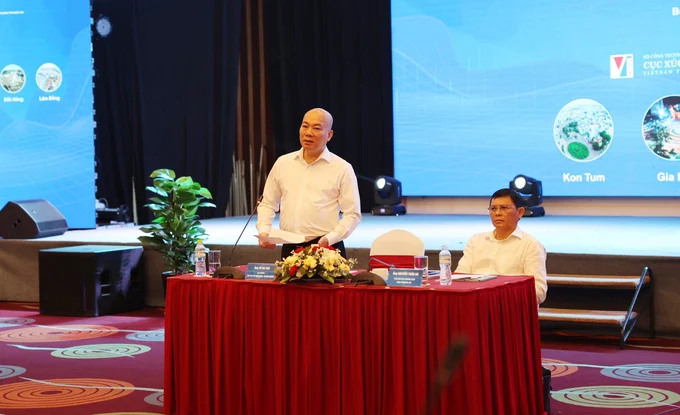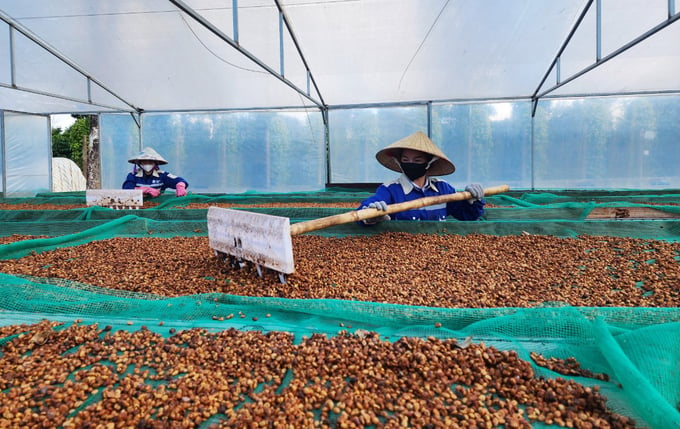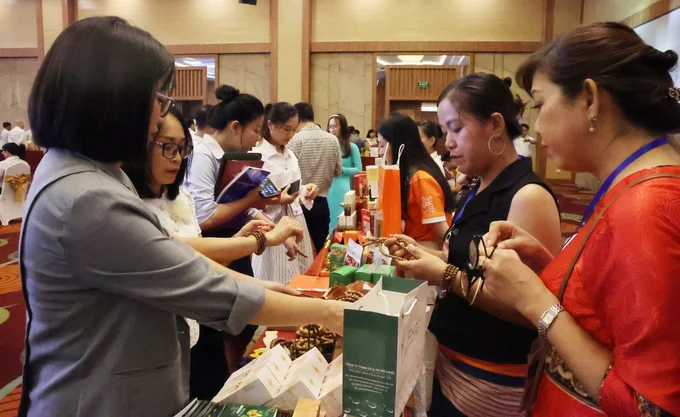May 29, 2025 | 22:26 GMT +7
May 29, 2025 | 22:26 GMT +7
Hotline: 0913.378.918
May 29, 2025 | 22:26 GMT +7
Hotline: 0913.378.918
On April 26, the Ministry of Industry and Trade, in coordination with the People's Committee of Dak Lak province, organized a Trade Promotion and Import-Export Development Conference for the Central Highlands region.
The conference was attended by over 200 delegates, including leaders of the People's Committees from the five provinces in the Central Highlands, associations, domestic and international business support organizations, enterprises, and cooperatives.
In his opening remarks, Mr. Vu Ba Phu, Director General of the Trade Promotion Agency (Ministry of Industry and Trade), stated that the Central Highlands region has become a major producer of key agricultural products on a large scale, particularly industrial crops and fruits.

Mr Vu Ba Phu, Director General of the Trade Promotion Agency (Ministry of Industry and Trade), stated that the total import-export turnover of the entire Central Highlands region reached about $ 4.6 billion, accounting for less than 1% of the country's total import-export turnover. Photo: Quang Yen.
According to Mr Phu, some Vietnamese export items are ranked among the top in the region as well as globally, with the Central Highlands contributing many products such as coffee, black pepper, passion fruit, cashew nuts, macadamia nuts, and rubber.
In the Central Highlands, the area for cultivating precious medicinal herbs such as Ngoc Linh ginseng, cordyceps, red lingzhi mushrooms, ginseng, astragalus, angelica, and saffron is rapidly expanding to form concentrated areas of medicinal herbs.
However, the export turnover of the Central Highlands region is still very modest. In the past 2 years (2022 and 2023), the total import-export turnover of the region reached about USD 4.6 billion, accounting for less than 1% of the country's total import-export turnover. The export structure of the region mainly focuses on a number of fruit tree groups, some industrial crops, coffee, spices, medicinal plants, and resource exploitation.
"Although the Central Highlands has all the conditions for development, it currently faces many 'bottlenecks' in terms of mechanisms, policies, science and technology, lack of high-quality human resources, weak logistics infrastructure, and inadequate physical infrastructure. In addition, the production and processing scale of agricultural products in the region is still small, and there is a lack of deep processing centres, resulting in exported products or export-serving raw materials being crude, providing low value for the people and businesses.
In particular, intra-regional linkages are showing many weaknesses, looseness, and lack of comprehensive investment, leading to a shortage of supply chains. These constraints create many barriers to trade promotion activities for the domestic market and the development of import-export of goods and services from the region to the world", Mr Phu informed.

Coffee accounts for a large proportion of exports in the Central Highlands region. Photo: Quang Yen.
Mr. Phu further stated that the conference is an important regional trade promotion activity aimed at strengthening trade promotion, production linkage, supply and demand connection, and enhancing brand promotion of the Central Highlands region.
Through the conference, delegates exchanged views and tackled difficulties and obstacles in regional connectivity, economic development, and import-export activities in the Central Highlands. This contributes to pulling the Central Highlands out of the "trough" in trade development, gradually narrowing the gap in income and commercial development compared to the national average in the future.
At the conference, delegates focused on discussing issues such as: the current situation and solutions to promote the linkage and consumption of agricultural products linked to origin tracing; Central Highlands linkage in trade promotion and export of coffee, and cocoa; some difficulties and obstacles in export; development of exports of industrial tree products; results of some trade promotion activities on social media platforms and e-commerce platforms...
Delegates believed that the Central Highlands needs to change its mindset, perception, and approach to exploiting the region's unique advantages and find truly effective regional connectivity solutions. Only then can the Central Highlands fully leverage its potential and strengths, turning potential into dynamic energy, resources, and large reserves. At the same time, it is necessary to promote science, technology, and chain linkages in production to increase the value of products, and regional linkages in trade promotion and import-export activities on a professional scale.
According to Mr. Nguyen Tuan Ha, Standing Vice Chairman of the People's Committee of Dak Lak Province, the locality has strengths in agricultural production, and industrial tree products such as coffee, rubber, pepper, cashew nuts, and honey.
Exports of agricultural products have always been a strength of Dak Lak Province in recent years and have achieved remarkable achievements. The province's goods have been exported to over 70 countries and territories worldwide, penetrating many demanding markets such as Japan, the United States, and the EU; each year, the province's export turnover reaches over $ 1.5 billion.

Delegates visited booths showcasing the key products of the Central Highlands region. Photo: Quang Yen.
"Through the conference, Dak Lak hopes to connect the production value chain of the region with the consumption demand of provinces, cities, and regions across the country and participate more deeply in the global value chain. Provinces together enhance the effectiveness of trade promotion, develop import-export activities, and support the region's products and services to find suitable market directions in the context of the complex global economic situation", Mr. Ha said.
Alongside the conference, there were exhibitions, introductions, and promotions of products from suppliers of goods and services within and outside the Central Highlands region with exporting enterprises.
Furthermore, the Trade Promotion Agency collaborated with some Trade Offices, Branch Trade Offices, and Vietnam Trade Offices abroad to organize online trading connections between production and trading enterprises of vegetables, fruits, coffee, and processed foods, both within and outside the Central Highlands region, with nearly 30 importers from important export markets such as the Philippines, China, the United States, Hong Kong,...
Translated by Hoang Duy

(VAN) Ms. Nguyen Thi Dung, Deputy Director of Ngoc Hoang Cooperative, shared about the journey of bringing dragon fruit to Europe, achieving annual revenues in the billions of VND.

(VAN) Bamboo products from Thang Tho Bamboo Cooperative have reached many countries around the world, while also creating jobs for local workers.

(VAN) The Management Board of Con Dao National Park reported that a green sea turtle, tagged in the Philippines, has traveled thousands of kilometers to lay 84 eggs on Bay Canh Islet.

(VAN) Green technology is paving a new path for sustainable aquaculture in the Mekong Delta in particular and across the country in general, helping reduce emissions and adapt to climate change.

(VAN) On May 27, La French Tech Vietnam (the French startup and innovation community in Vietnam) held the French Tech Summit Vietnam 2025.
/2025/05/27/4731-2-223159_980.jpg)
(VAN) No votive paper, no styrofoam, no plastic bags, no plastic bottles, and no single-use plastic trays are the key rules tourists should keep in mind when visiting Con Dao.

(VAN) In the fight against plastic pollution, Vietnam has been demonstrating a proactive, pioneering, and active role in addressing the greatest environmental challenge today.